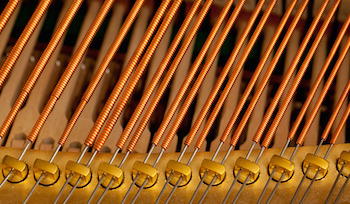As a piano owner, you probably have your piano tuned on a regular basis to keep it playing and performing at the best of its abilities. Yet despite regular tuning, you may still notice a deterioration of its performance.
Tuning adjusts the strings and the pins, the system that determines the pitch of each string. Your piano also requires a periodic servicing called regulation, which adjusts the mechanical parts causing the strings to sound when the keys are played and the pedals are used.
Regulation is the adjustment of the mechanical aspects of the piano to compensate for the effects of wear, the settling of cloth and felt, as well as the dimensional changes in the wood and other materials due to changes in humidity levels. There are three system involved in the regulation process: the action, the trapwork and the damper system.
The action is the mechanical part of the piano that transfers the energy of the stroke of the keys to the hammers that strike the strings. The action is the most complex system of the piano, with over 9,000 working parts that are able to respond to a pianist’s every movement.
- The trapwork are the levers, dowels and springs that connect the pedals to the action.
- The damper system stops the vibration of the string as you strike and release the key, and is controlled by both keys and the pedal system.
- While tuning your piano corrects the pitch of your piano, regulation attends to the touch and responsiveness of your action, all vital in creating the performance you are striving for.
All upright and grand pianos need periodic regulation to perform at their peak levels. Frequency of regulation is dependent on a variety of things, including how often your piano is used, exposure to climate changes, the piano’s quality, the age of the piano, and how well its maintained. A new piano may require regulation in its first year as it settles and adjusts to its new form and environment. The frequency after that is often determined by you and your piano technician
If your piano displays a lack of sensitivity, or simply doesn’t have the range it once had, it may be time for regulation. If you notice the keys are not level, the keys are sticking, or they are uneven to the touch, it may be time for regulation.
No amount of playing or practice can compensate for a piano that is not at its proper playing level. The only way to get a quality sound every time you play is to tune and regulate your piano on a regular basis.

